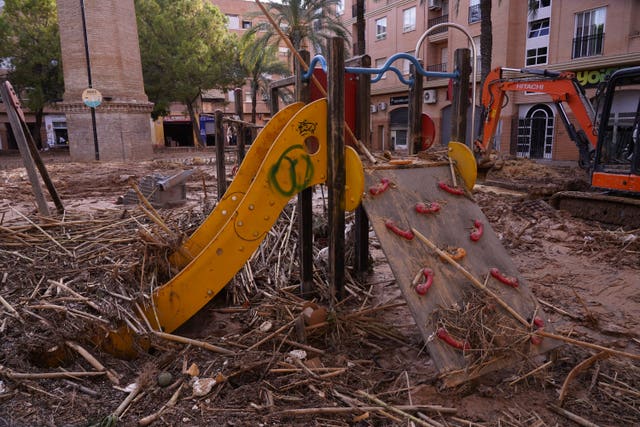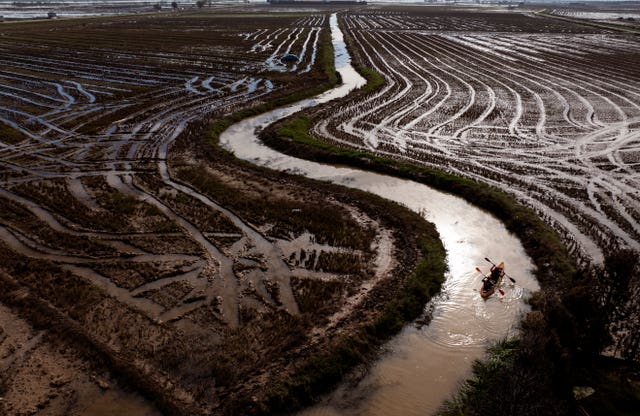
New storms in Spain have caused school closures and train cancellations, two weeks after flash floods in the Valencia region killed more than 220 people and destroyed thousands of homes.
Coastal areas of Valencia were placed under the highest alert on Wednesday evening, with forecasters warning up to 180mm (7in) of rain could fall there within five hours.
Clean-up efforts in parts of Valencia hardest hit by the October 29 storm are continuing, and there are concerns over what more rain could bring to streets still covered with mud and debris.

In southern Malaga province, streets were flooded while 3,000 people near the Guadalhorce river were moved from their homes as a preventative measure.
Schools across the province were closed, along with many stores. Train services were cancelled between Malaga and Madrid, and between Barcelona and Valencia.
Valencia’s regional government also restricted the use of private vehicles until Thursday in areas hit by the October storm, when tsunami-like floods caused cars to be washed away.

There were no reports of deaths due to the new storms.
Spanish weather forecaster AEMET put Malaga on red alert, saying up to 70mm (3in) of rain had accumulated in an hour. Parts of Tarragona province in the east also faced heavy rain and remained under red alert.
The forecast in Malaga delayed the start of the Billie Jean King Cup tennis finals between Spain and Poland, which was set for Wednesday.
The storm system affecting Spain is caused by warm air that collides with stagnant cold air and forms powerful rain clouds. Experts say that drought and flood cycles are increasing with climate change.


Why are you making commenting on The Herald only available to subscribers?
It should have been a safe space for informed debate, somewhere for readers to discuss issues around the biggest stories of the day, but all too often the below the line comments on most websites have become bogged down by off-topic discussions and abuse.
heraldscotland.com is tackling this problem by allowing only subscribers to comment.
We are doing this to improve the experience for our loyal readers and we believe it will reduce the ability of trolls and troublemakers, who occasionally find their way onto our site, to abuse our journalists and readers. We also hope it will help the comments section fulfil its promise as a part of Scotland's conversation with itself.
We are lucky at The Herald. We are read by an informed, educated readership who can add their knowledge and insights to our stories.
That is invaluable.
We are making the subscriber-only change to support our valued readers, who tell us they don't want the site cluttered up with irrelevant comments, untruths and abuse.
In the past, the journalist’s job was to collect and distribute information to the audience. Technology means that readers can shape a discussion. We look forward to hearing from you on heraldscotland.com
Comments & Moderation
Readers’ comments: You are personally liable for the content of any comments you upload to this website, so please act responsibly. We do not pre-moderate or monitor readers’ comments appearing on our websites, but we do post-moderate in response to complaints we receive or otherwise when a potential problem comes to our attention. You can make a complaint by using the ‘report this post’ link . We may then apply our discretion under the user terms to amend or delete comments.
Post moderation is undertaken full-time 9am-6pm on weekdays, and on a part-time basis outwith those hours.
Read the rules here